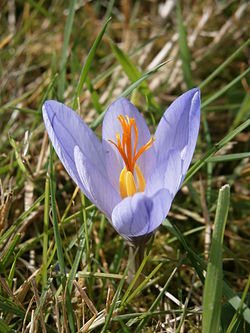| Crocus cancellatus | |
|---|---|
 | |
| Scientific classification | |
| Kingdom: | Plantae |
| Clade: | Tracheophytes |
| Clade: | Angiosperms |
| Clade: | Monocots |
| Order: | Asparagales |
| Family: | Iridaceae |
| Genus: | Crocus |
| Species: | C. cancellatus |
| Binomial name | |
| Crocus cancellatus | |
| Synonyms [1] | |
| |
Crocus cancellatus is a species of flowering plant in the family (biology Iridaceae . [1] [2] It is found from the Balkan Peninsula to Iran. [3]
Crocus cancellatus is a corm growing to 0.1 by 0.1 m (3.9 in by 3.9 in). It is hardy to zone (UK) 5 and is not frost tender. It is in flower from September to November, and the seeds ripen from March to May. [4]